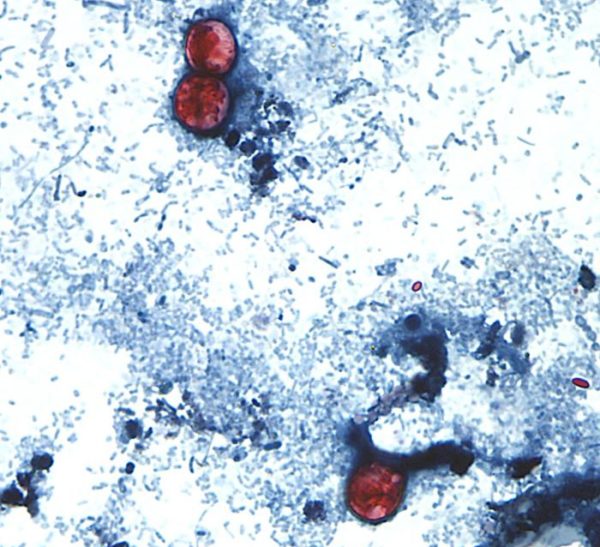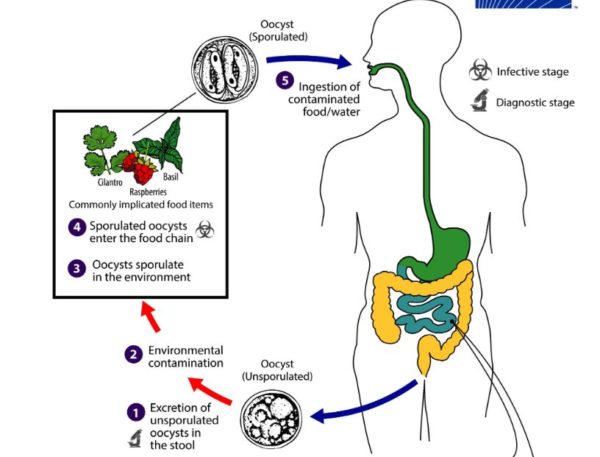Arlington and Northern Virginia are experiencing a possible outbreak of cases from a particular foodborne illness.
Dozens people in the region are suspected of having contracted a gastrointestinal illness called Cyclosporiasis, according to a spokeswoman for the Virginia Department of Health. The outbreak involves “two large businesses” where more than 40 people were sickened, possibly with Cyclosporiasis, as well as 15 confirmed cases of the disease, officials say.
“A food or water source of this outbreak has not yet been identified, and the investigation is ongoing,” said the state health department.
“Cyclosporiasis is an intestinal illness caused by a microscopic parasite,” the department noted in a press release today (Tuesday.) “People can become infected by consuming food or water contaminated with feces or stool that contains the parasite.”
The 15 confirmed cases of people infected with Cyclospora since mid-June compares to eight cases in Northern Virginia by this time last year.
The affected area includes Arlington, Alexandria, Fairfax County and Falls Church.
“Arlington County has… experienced an increase in cases of illness due to Cyclospora,” confirmed epidemiologist Colleen Ryan Smith of Arlington’s Department of Human Services.
“The increase in Arlington… has contributed to the increase in cases noted for Northern Virginia,” added Smith, who said that “specific counts of cases by locality [are] not possible due to patient privacy and confidentiality considerations.”
Officials said they could also not identify the “two large businesses” where dozens were sickened.
Symptoms can begin one week after exposure to the parasite, and typically include explosive diarrhea, stomach cramps, nausea, aching muscles, and a low-grade fever. Symptoms can last days or a month for some, but others can be a carrier of the parasite and experience no symptoms.
Those afflicted can only be diagnosed by a lab test ordered by a doctor.
Health officials have also reported 90 cases of Cyclospora in New York City since January, and over 100 cases in Massachusetts since May. In both areas, the number of cases is approximately three times the normal number officials usually see in a year, and the cause is not yet known.
Officials in all three locales say they are still investigating the cause of the outbreak. Previous outbreaks were linked to contaminated produce.
The full press release is below, after the jump.
The health districts in northern Virginia are notifying the public that there has been a significant increase in the number of reported cyclosporiasis cases since mid-June 2019. To date there are 15 cyclosporiasis cases reported in the Northern Region of Virginia, up from eight at this time last year. Additionally, more than 40 people from two large businesses in the area have reported gastrointestinal illness, and are under investigation for suspected cyclosporiasis. A food or water source of this outbreak has not yet been identified, and the investigation is ongoing.
Cyclosporiasis is an intestinal illness caused by a microscopic parasite. People can become infected by consuming food or water contaminated with feces or stool that contains the parasite. Illness occurs most often in tropical and subtropical regions. In the United States, past foodborne outbreaks of cyclosporiasis have been linked to various types of imported fresh produce, such as raspberries, basil, arugula, snow peas, mesclun lettuce, and cilantro. Of 39 U.S. Cyclospora outbreaks between 2000-2017, none have been associated with commercially frozen or canned products.
Northern Virginia health districts* are investigating cases across the region and working to identify the potential source or sources of the outbreak. The Virginia Department of Health (VDH) is working with local, state and federal health officials to investigate the increase in Cyclospora illnesses and will share information as it becomes available.
Symptoms:
Cyclosporiasis typically causes watery diarrhea, with frequent, sometimes explosive, stools within one to two weeks after exposure. Other common symptoms include loss of appetite, weight loss, abdominal cramping or bloating, nausea and prolonged fatigue. Vomiting, body aches, low-grade fever, and other flu-like symptoms may be noted. If untreated, the illness may last for a few days to a month or longer and may seem to go away but come back again.
Anyone experiencing symptoms of cyclosporiasis should visit their healthcare provider. They can test for Cyclospora and prescribe the correct treatment.
Prevention:
Following safe fruit and vegetable handling recommendations is the best way to prevent cyclosporiasis:
- Wash: Wash hands with soap and warm water before and after handling or preparing fruits and vegetables.
- Prepare: Wash all fruits and vegetables thoroughly under running water before eating, cutting, or cooking.
- Fruits and vegetables that are labeled “prewashed” do not need to be washed again at home. Scrub firm fruits and vegetables, such as melons and cucumbers, with a clean produce brush. Cut away any damaged or bruised areas on fruits and vegetables before preparing and eating.
- Store: Refrigerate cut, peeled, or cooked fruits and vegetables as soon as possible, or within 2 hours.
For more information, visit www.vdh.virginia.gov/epidemiology/epidemiology-fact-sheets/cyclosporiasis/ or www.cdc.gov/parasites/. For questions, please contact your local health department office. Locate contact information for your closest office at www.vdh.virginia.gov/health-department-locator.
###
*Northern Virginia Health Districts involved in this investigation include Alexandria, Arlington, Fairfax (Fairfax County, the City of Fairfax and Falls Church), Loudoun, and Prince William (Prince William County and the cities of Manassas and Manassas Park).
Images via the CDC



